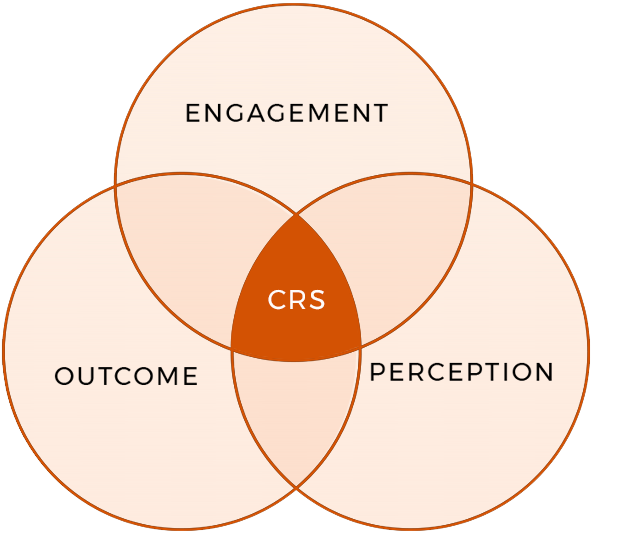RESOURCES ⇢ CUSTOMER RELATIONSHIPS
Customer Relationship Score (CRS)
Customer Relationship Score (CRS) is a critical metric found only on 7% of dashboards.³
CRS uniquely allows your organization to define, measure and improve your relationships.
Discover how to drive significant growth by adding this powerful metric in your dashboard.
Discover how to drive significant growth by using this powerful new metric.
JUMP TO: KEY TAKEAWAYS · GUIDES · Q&A
JUMP TO:
KEY TAKEAWAYS · GUIDES · Q&A

Customer Relationship Score (CRS)

A measure of trust, emotional connection, and strategic alignment between employees and customers, assessed by customer-facing roles to increase win probability (PWin) and guide deeper relationships for greater loyalty and retention. CRS is used to assess and strengthen a single customer relationship or across prioritized accounts in B2B and B2G organizations.
Customer Relationships Are a Blind Spot for Organizations
Companies spend more than $15B annually on customer relationship management,¹ yet 70% of CRM implementations fail.² This waste is due to an overreliance on software and traditional metrics, failing to define, measure, monitor or even improve customer relationships, with only 7% actively tracking customer relationship scores.³ This results in an overestimated relationship quality, blind spots to shifting needs, and vulnerability to competitors.
CRS Addresses Critical Gaps in Actionable Customer Intel
Despite significant CRM investments, organizations severely lack the essential customer intel needed for growth decisions, often relying on outdated, purchased data and outdated processes, contributing to poor data quality costing $12.9M annually⁴ and resulting in an average 60-80% failure rate in B2B sales. CRS-driven organizations gain the competitive advantage by prioritizing organic insights from customer-facing interactions, uncovering customer priorities, emotional drivers and strategic criteria, transforming CRM from a data repository into a revenue accelerator with 41% annual growth potential.⁵
CRS Is a Leading Indicator for Growth
CRS serves as a predictive metric that ties customer relationship quality directly to key business outcomes like revenue growth, retention, and win probability, enabling C-suite leaders to identify risks and opportunities early, adjust strategies, and prevent revenue loss— avoiding the pitfalls of operating blindly with more transactional metrics that often fail to correlate strongly with results.
CRS Provides a Strong, Competitive Advantage
By measuring trust and strategic alignment, CRS fosters deeper, irreplaceable partnerships that boost organic growth, customer lifetime value, resource allocation, and market position, giving organizations a significant edge in retention and growth strategies through CRS-driven dashboards—providing a snapshot view of customer relationship quality across prioritized contacts and accounts. Additionally, improved customer engagement can increase win likelihood by 80%⁶ and annual revenue by 23%.⁷
¹ DigitalSilk CRM Report | ² The Oxford Review | ³ SuperOffice Report | ⁴ Gartner | ⁵ Hubspot 2024 Sales Trend Report | ⁶ Deltek Federal Procurement Success
COMING SOON

GUIDE | 16 MIN READ
A customer relationship score is a numerical metric that evaluates the strength of a business’s bond with customers, based on trust, engagement, and alignment. It’s essential in B2B and B2G for predicting and driving retention and growth.
Hi-Q Group’s Customer Relationship Score (CRS) is a proprietary method using employee insights to rate relationships on a 1-10 scale. It focuses on observable actions, like collaboration frequency, to provide actionable data.
Unlike generic scores, CRS emphasizes complex relationship dynamics in B2B and B2G organizations, making it a game-changer for sales.
As the saying goes, “you can’t manage what you don’t measure.” You need a relationship score to gain a clear, objective view of customer engagement and relationship strength, as traditional metrics often miss deeper aspects of relationships like trust and alignment.
In B2B and B2G, where strong relationships drive revenue, a score identifies potential risks like churn on an ongoing basis, helping your organization avoid blind spots from subjective views. Customer Relationship Score (CRS) addresses this by measuring customer sentiment and connections, serving as a north star metric to foster strong relationships and customer success.
A customer relationship score is important because it reveals the health of relationships, linking customer engagement to business impact like reduced customer churn and increased revenue. It acts as a warning signal for risk accounts, highlighting trends in customer sentiment that traditional surveys miss. CRS is a KPI with deep correlation to outcomes, enabling businesses to build strong relationships and achieve customer success by addressing issues early.
Leaders rely on customer engagement metrics like Net Promoter Score (NPS), Customer Satisfaction Score (CSAT), and Customer Effort Score (CES) to gauge relationship health, but these tools often fall short.
Designed for transactional moments, like a satisfaction survey after an engagement, these tools leave a critical gap for B2B and B2G organizations. Even when combined into customer health scores, they provide a fragmented view, missing the depth needed for complex sales cycles with high-stakes decisions.
Customer Relationship Score (CRS) is a true measurement of customer relationships, measuring trust, emotional connection and strategic alignment between an employee and a customer.
A good customer relationship score is 7 or higher on a -5 to 10 scale, indicating strong relationships with high trust and alignment for customer success. Scores of 8-10 (Collaborative to Synergistic) show excellent health, while 5-7 (Cooperative) suggest room for improvement. Hi-Q Group’s CRS considers 7+ good, as it correlates with lower customer churn and higher expansion, serving as a north star metric for businesses.
The benefits of customer relationship scores include bridging relationships to revenue, identifying opportunities and potential risks, and providing a realistic view of relationship strength. They foster customer engagement by revealing trends in customer sentiment, reducing churn, and boosting expansion. Hi-Q Group’s CRS offers insights on an ongoing basis, helping organizations prioritize client accounts, counter subjective views, and achieve business impact through strong relationships.
Use customer relationship scores to integrate into CRM dashboards for regular reviews, prioritizing risk accounts and guiding actions like outreach to a client. Track on an ongoing basis to monitor trends and foster customer engagement. Hi-Q Group’s CRS should be used in account reviews to align teams, mitigate issues, and drive expansion, making it a key KPI for business growth.
A customer relationship scorecard is a visual tool or dashboard that evaluates the overall health of customer relationships using key metrics like trust, engagement, and satisfaction. It helps businesses track performance over time, identify strengths, and spot risks in B2B partnerships.
Hi-Q Group’s Customer Relationship Score (CRS) powers an effective scorecard by assigning a numerical value (e.g., -5 to 10) based on employee assessments of observable behaviors, such as how often customers share insights or collaborate. Unlike basic scorecards focused on transactional data, a CRS-based scorecard includes:
For example, a scorecard might show a CRS of 8/10 for a key client, indicating strong potential for upsell, while a 4/10 flags churn risks.
A customer relationship score measures relationship quality by evaluating trust, interaction, and alignment through observable behaviors, providing a holistic view of health. It assesses aspects of relationships like openness and connections to gauge customer sentiment. Hi-Q Group’s CRS measures quality via employee insights, scoring from -5 (Adversarial) to 10 (Synergistic), revealing deep correlation to revenue and serving as a warning signal for churn.
Customer Relationship Score (CRS) can either be calculated by the Hi-Q CRS Assessment or as part of a composite score of other factors.
Hi-Q Group CRS scores are derived from ratings based on employee observations through their proprietary survey. Businesses may then adjust weights for their unique needs by incorporating additional metrics such NPS, purchase data or engagement frequency.
Other CRS composite score formulas vary by industry, with B2C organizations incorporating more transactional customer data. For example, some companies may use (Engagement Score × 0.3) + (Satisfaction Score × 0.3) + (Purchase History × 0.2) + (Support Quality × 0.2) = CRS. Others may use a weighted average of sentiment, engagement, and alignment, scored on a 1-5 scale.
However, most B2B and B2G organizations dealing with more complex sales cycles require a composite score going beyond transactional moments. The Hi-Q CRS Assessment was designed to dig deeper into aspects of trust and customer alignment, creating an easy framework for teams to define, measure and improve their customer relationships over time.
The CRS assessment scores relationships on a scale from -5 to 10, sorted into six categories. For example, you may have a relationship score of 8/10 (Collaborative), indicating strong relationships with high trust and expansion potential. An account scoring 9 (Synergistic) would indicate frequent interaction and openness, boosting revenue; a 4 (Reactive) flags risk accounts for actions to prevent churn. This shows deep correlation to customer success and business outcomes.
CRS assessments are sent to employees via existing channels, with API integrations driving insight results and scores seamlessly within your CRM dashboards, customer success strategies, and growth plans, delivering a powerful new perspective without disrupting your workflows.
Whether you’re analyzing an individual customer, a key account, or your entire customer base, CRS provides actionable insights at every level—tracking trust and engagement in real time to help you prioritize efforts effectively.
If you would like to see if you qualify for our pilot CRS program, schedule a chat with our growth specialist today.
Focus on the Customer to Grow
Focus on the
Customer to Grow
GOOGLE 4.9/5 STAR RATING
Join hundreds of teams creating Winning Relationships® with Hi-Q Group.
privacy policy | terms of use | course terms & conditions | © hi-q group, llc.
privacy policy | terms of use | course terms & conditions | © hi-q group, llc.